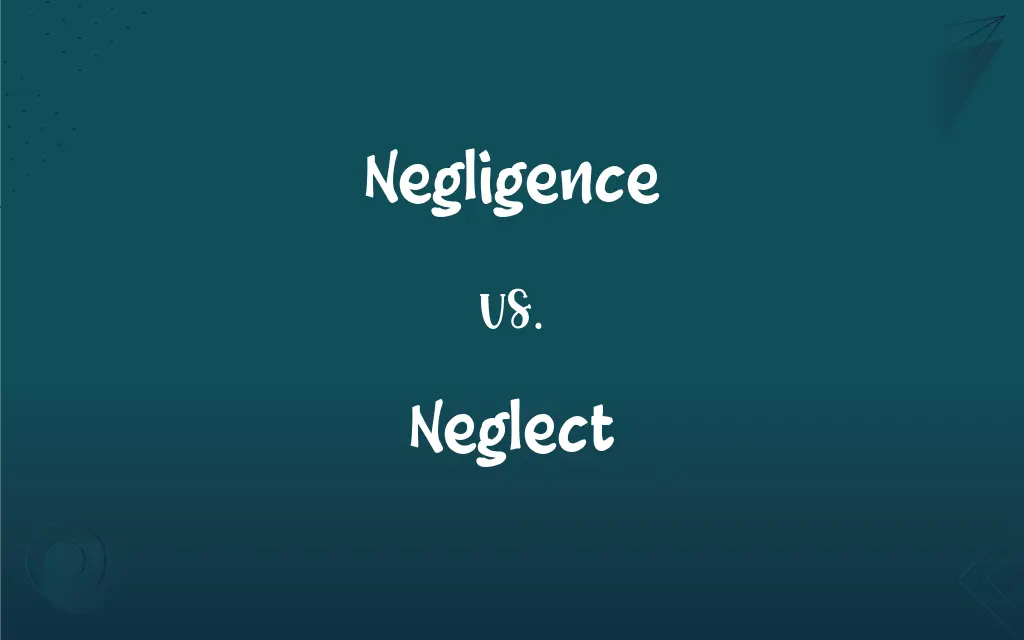Negligence vs. Neglect: What's the Difference?
Edited by Janet White || By Harlon Moss || Updated on November 29, 2023
Negligence is the failure to take proper care in doing something, while neglect is the act of not caring for or attending to someone or something.

Key Differences
Negligence is a legal term denoting the failure to exercise the standard of care expected, whereas neglect refers to the act of ignoring or not caring for something or someone.
Negligence can refer to carelessness in a variety of activities, while neglect specifically refers to the act of disregarding the needs or welfare of something or someone.
Negligence often implies a passive failure to act responsibly, while neglect suggests a more deliberate disregard or indifference.
The consequences of negligence might be unintended harm or damage, whereas neglect often results in deterioration or suffering due to lack of attention.
Negligence is widely used in legal, medical, and professional contexts, while neglect is more commonly used in personal, social, and care-related contexts.
ADVERTISEMENT
Comparison Chart
Definition
Failure to take proper care
Act of not caring for or attending to something
Connotation
Implies carelessness or oversight
Suggests deliberate disregard or indifference
Context of Use
Legal, professional, medical
Personal, social, care-related
Implications
Can lead to unintended harm or damage
Often results in deterioration or suffering
Nature of Action
Passive failure to act responsibly
Active disregard or lack of attention
ADVERTISEMENT
Negligence and Neglect Definitions
Negligence
The failure to exercise the standard of care that a reasonably prudent person would have exercised.
His negligence in not checking the equipment led to the accident.
Neglect
To fail to care for properly.
The old house was neglected for years and fell into disrepair.
Negligence
A legal cause of action resulting from carelessness.
The lawsuit alleged negligence on the part of the construction company.
Neglect
To pay no attention or too little attention to.
The garden has been neglected and has become overgrown.
Negligence
A lapse in attention or carelessness.
His negligence in locking the door put the house at risk.
Neglect
To ignore or disregard harmfully.
She neglected her duties as a supervisor, leading to chaos in the office.
Negligence
A neglect or disregard of duty.
The doctor's negligence cost her the trust of her patients.
Neglect
The state of being uncared for.
The neglect of the park was evident in the unkempt lawns.
Negligence
An inadvertent or careless action.
Negligence in maintaining the car resulted in a breakdown.
Neglect
The act or state of disregarding.
His neglect of his health led to serious complications.
Negligence
The state or quality of being negligent.
Neglect
To pay little or no attention to; fail to heed; disregard
Neglected their warnings.
Negligence
A negligent act or a failure to act.
Neglect
To fail to care for or attend to properly
Neglects her appearance.
FAQs
What is the primary focus of negligence?
Negligence primarily focuses on a failure to take reasonable care that results in damage or harm.
Can negligence be unintentional?
Yes, negligence can be unintentional, arising from carelessness or oversight.
How is neglect different from negligence?
Neglect specifically involves disregarding the needs or care of something or someone, often deliberately.
Can neglect occur in personal relationships?
Yes, neglect can occur in personal relationships, where it involves failing to provide adequate attention, care, or support.
Are negligence and neglect interchangeable?
While they have overlapping meanings, they are not completely interchangeable due to their different connotations and contexts.
Is neglect always intentional?
Neglect is not always intentional; it can also stem from ignorance or inability to provide proper care.
Is negligence always a legal matter?
While often a legal matter, negligence can also refer to general carelessness in everyday activities.
How does negligence relate to professional duty?
In a professional context, negligence refers to the failure to perform one's duties with the expected level of care and competence.
Can neglect be a form of abuse?
Yes, neglect can be a form of abuse, especially when it leads to harm or suffering.
Does negligence require proof of harm?
Yes, proving negligence typically requires showing that harm or damage was caused by the careless action.
Is it possible to sue for negligence?
Yes, individuals can sue for negligence if they can prove that careless actions caused them harm or loss.
What constitutes negligence in healthcare?
In healthcare, negligence involves failing to provide the standard of care that a competent health professional would offer, leading to patient harm.
Can a company be negligent?
Yes, a company can be negligent if it fails to adhere to safety standards or regulations, resulting in harm or damage.
What is the role of intent in negligence?
Intent is not a primary factor in negligence; it's more about the failure to act with due care.
Can neglect happen in institutional settings?
Yes, neglect can occur in institutional settings, such as nursing homes or schools, due to inadequate care or attention.
Are there different types of neglect?
Yes, neglect can be physical, emotional, educational, or medical, among others.
What are the signs of child neglect?
Signs of child neglect include lack of proper nutrition, hygiene, medical care, and emotional support.
How is neglect addressed in child care?
In child care, neglect refers to failing to provide a child with necessary basic needs, such as food, shelter, and emotional care.
Is self-neglect recognized as a serious issue?
Yes, self-neglect, where individuals fail to care for their own basic needs, is recognized as a serious concern.
Can negligence lead to criminal charges?
In some cases, particularly when harm is significant, negligence can lead to criminal charges.
About Author
Written by
Harlon MossHarlon is a seasoned quality moderator and accomplished content writer for Difference Wiki. An alumnus of the prestigious University of California, he earned his degree in Computer Science. Leveraging his academic background, Harlon brings a meticulous and informed perspective to his work, ensuring content accuracy and excellence.
Edited by
Janet WhiteJanet White has been an esteemed writer and blogger for Difference Wiki. Holding a Master's degree in Science and Medical Journalism from the prestigious Boston University, she has consistently demonstrated her expertise and passion for her field. When she's not immersed in her work, Janet relishes her time exercising, delving into a good book, and cherishing moments with friends and family.































































